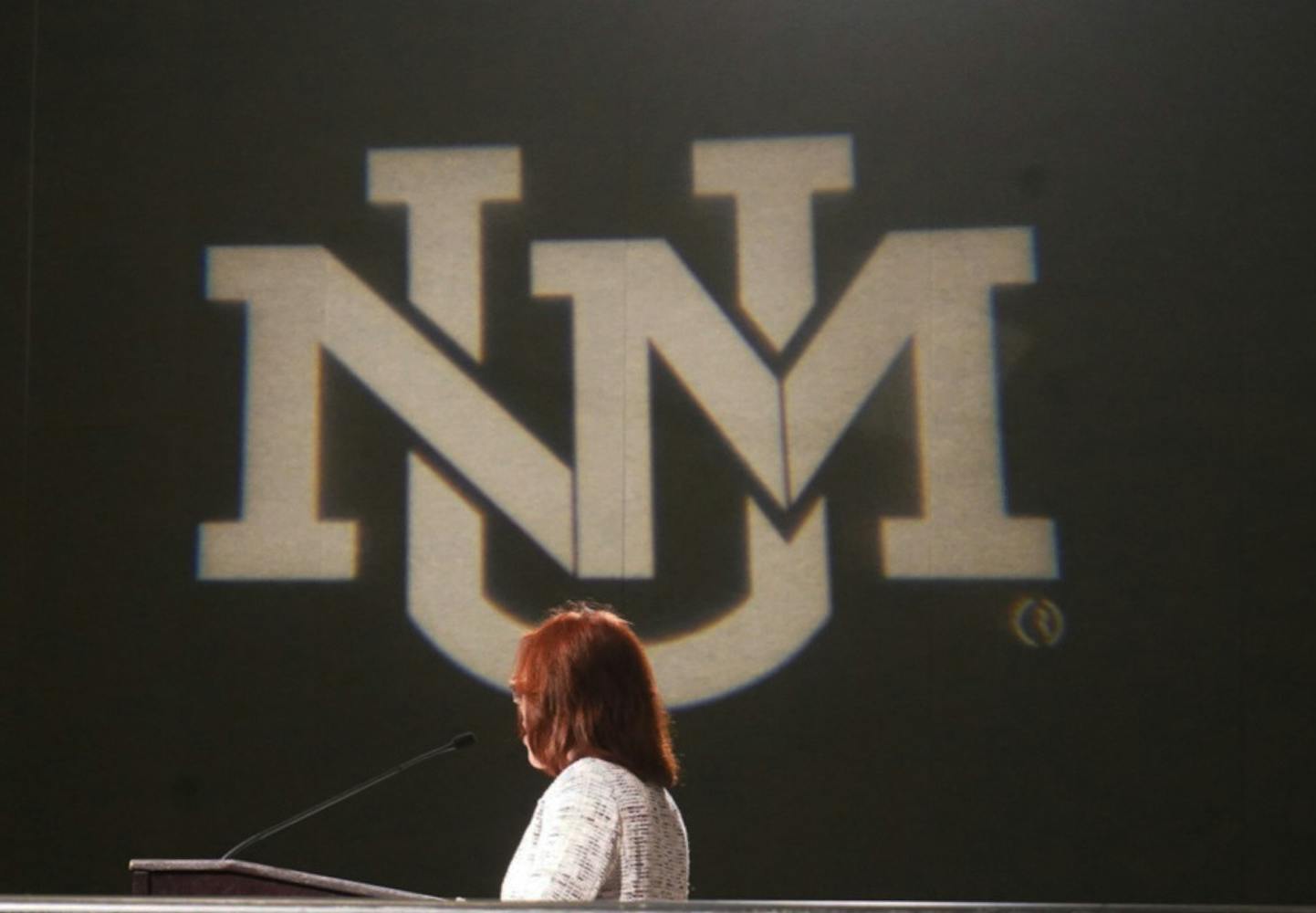On Monday, March 4, Garnett Stokes, President of the University of New Mexico, gave her annual State of the University address. She reflected on UNM’s past as it embarks on its future with discussions of safety, student success and overall campus climate at the forefront of her speech.
Stokes discussed several avenues of achievement across campus, including student and alumni achievements and campus connections. She also touched on safety and scarcity.
“Before we talk about the future, it is our responsibility to honor the past,” Stokes said.
Student Success and Engagement
Stokes discussed UNM’s status as a Carnegie Research-1 Institution, alongside being a minority-majority school. She detailed student research and engagement, including Artificial Intelligence advancements, quantum information science and engineering, dry land innovation within the Science, Technology, Engineering and Math fields.
At UNM’s new Accelerating Resilience Innovations in Drylands (ARID) Institute, researchers and staff are currently “working to ensure human societies can sustainably thrive and grow in arid places,” Stokes said.
Each of these innovations serve as parts of UNM’s five 2040 goals, designed to build and shape the future of UNM, Stokes said.
She also discussed the increase in the number of first-year students during the past two school years, both breaking the school's record for the largest incoming first-year class. Stokes did not address that.
To accommodate the larger class sizes, the University's Freshman Residency Requirement arranged for UNM Resident Life and Student Housing to convert several double rooms into triples.
Stokes also did not mention the lack of affordable housing for and near the UNM community. Data gathered by UNM’s Basic Needs Survey found “43.6% of respondents were housing insecure in the previous 12 months.”
She also discussed the creation of project Coordinated Help in Lobo Experience (CHILE) – a portal that will allow students to get in contact with the appropriate staff or faculty to address their needs.
“(Project CHILE will) be a portal that provides students with a guided and interactive pathway with quick access to all sorts of help,” Stokes said.
Get content from The Daily Lobo delivered to your inbox
Campus Climate and Public Safety
Regarding the campus climate, Stokes mentioned campus climate surveys that were created with an aim to gain more insight on student and faculty experience. She did not specify the results of the surveys.
“As a result, we've been pleased to support our new initiatives for greater diversity, postdoc, faculty hiring and in mentoring for our students," Stokes said.
Stokes also spoke about the Basic Needs Survey conducted last year, addressing the insecurities of students, staff and faculty.
“67% of the individuals who completed the survey experience some form of basic needs insecurity,” Stokes said.
Since the survey, the Basic Needs Research Project has facilitated a roundtable discussion with United States Representative Gabe Vasquez (D) to discuss student eligibility for federal programs, she said.
Other programs created to address food insecurity, Stokes mentioned, include the implementation of LoboEats – an app created to redistribute leftover food from events on campus – and the Lobo Food Pantry. The 2023 Basic Needs Survey found that 40% of students, faculty and staff were food insecure.
A large part of Stokes’ address dealt with safety.
“We’ve engaged with our community and with Albuquerque police to support APD’s new University area command substation to ensure more dedicated coverage of the UNM campus community by the 40 full-time officers working from this facility,” Stokes said.
Until October, the UNM Police Department failed to comply with the federal Clery Act to provide an updated and informative Daily Crime Log and timely notifications of crime on campus. Without acknowledging this specifically, Stokes did address the lack of information in LoboAlerts and the unease that can create for students.
“We know we can do a better job of communicating with you about the improvements happening in our community. For example, while LoboAlerts is required by law to keep you advised of instances on or near campus, we know a lot of them lack context and often closure,” Stokes said.
The Department of Transportation recently granted UNM $2 million annually to “determine ways to make our campus and other campuses in the nation safer and more accommodating to bike traffic and pedestrians,” Stokes said.
New Mexico had the highest rate of pedestrian deaths in the U.S. from Jan. - June 2023, according to preliminary data from the Governors Highway Safety Association.
Stokes spoke about recent student demands for her public comment on what she described as “what hurts, what offends and what horrifies,” and her decisions to not make institutional statements during closing remarks. “There may, at times, be no message," Stokes said.
At the Board of Regents Meeting on February 19, public commenters called for UNM to divest from Israel and call for a cease-fire in Gaza, referencing a 1985 resolution that the Regents created to divest from South Africa in response to the apartheid.
“I recognize that the platform of the president of UNM is one of great privilege and influence, and I do feel there are issues that are important to speak out about, but my decision to weigh in on an issue or an event should be based on its connection to our mission and the impact on our community,” Stokes said.
Karina Bolaños is the Culture Editor at the Daily Lobo. They can be contacted at culture@dailylobo.com








